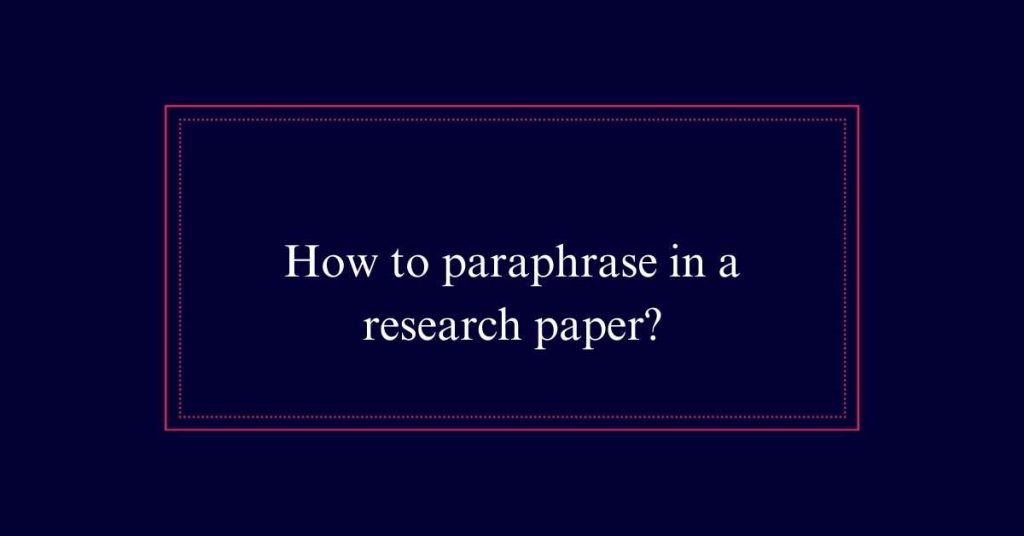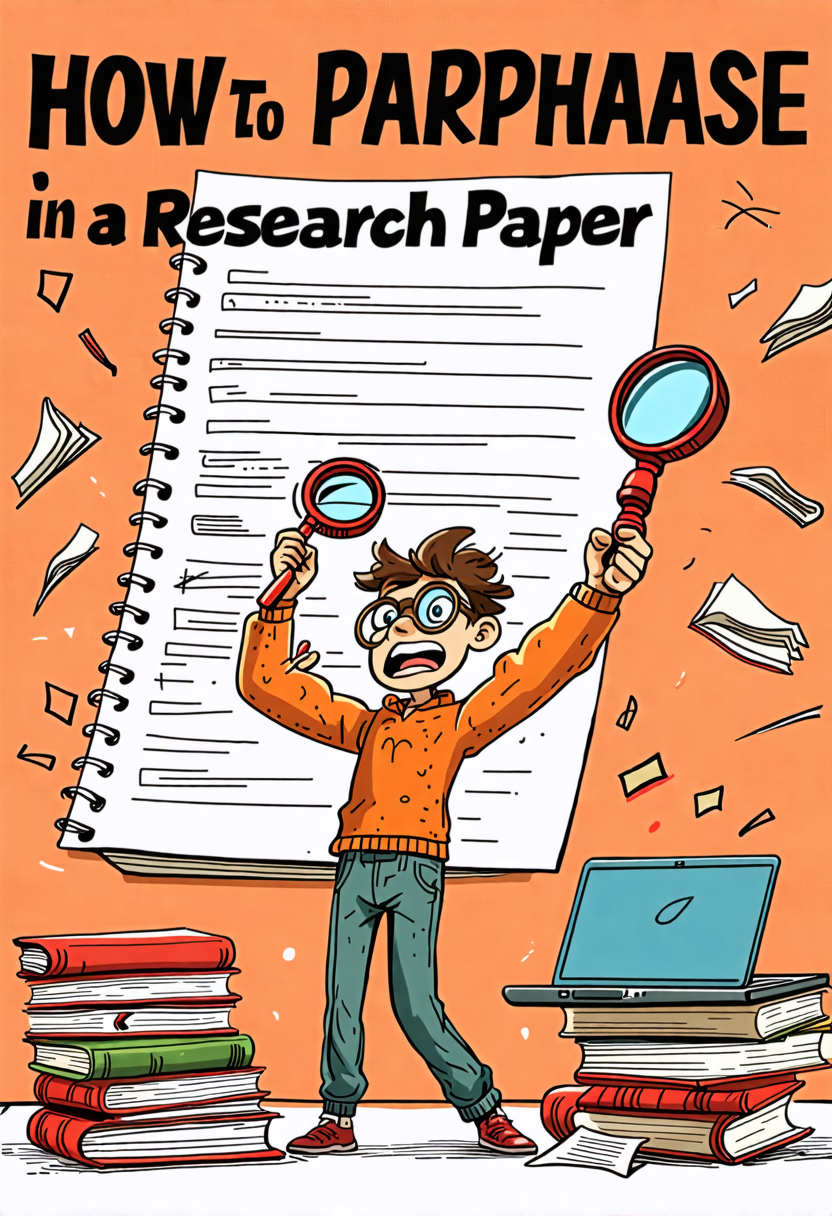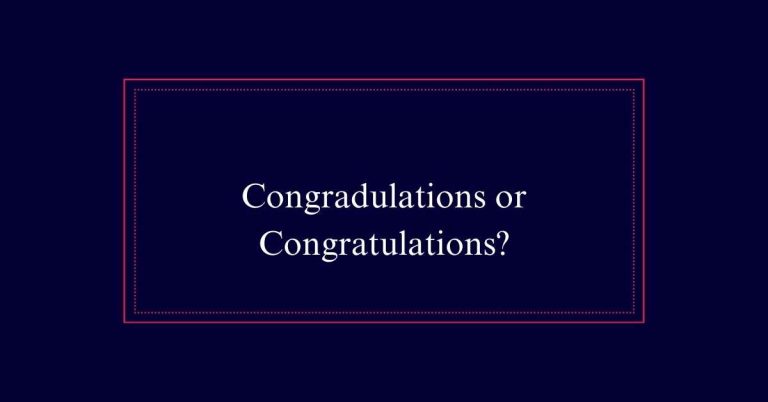How to paraphrase in a research paper?
Paraphrasing is essential for creating well-crafted research papers. It showcases your understanding of the topic and simplifies academic terminology, making it more accessible. By converting intricate concepts into simpler language, you improve the readability and engagement of your work. Utilize everyday language, avoid excessive jargon, and maintain concise sentence structures. This skill enables you to connect various ideas seamlessly and emphasize critical points. Proper paraphrasing is also crucial in preventing plagiarism.
Importance of Paraphrasing
Paraphrasing demonstrates that you’ve grasped the material and can articulate it in your own words. It’s an essential skill in research papers because it reflects your understanding. By rephrasing, you make intricate academic language more accessible to a wider audience, aiding more people in comprehending the ideas you’re presenting.
Moreover, paraphrasing enhances the readability of your paper. It enables you to integrate various ideas more smoothly. Instead of merely copying text, you transform it to align better with your own arguments and style.
Additionally, paraphrasing allows you to emphasize significant quotes. You can seamlessly incorporate these quotes into your writing, augmenting the overall impact of your paper.
Benefits for Research Papers
Transforming complex ideas into clear language enhances the quality of your research paper. Effective paraphrasing demonstrates your understanding of the source material, allowing you to connect different concepts and present them coherently. Readers value clear, concise writing that effectively communicates your points.
Additionally, paraphrasing improves readability by simplifying dense academic texts. This makes your paper more engaging and accessible. It also enables you to emphasize key information without overwhelming readers with direct quotes.
Transforming Academic Language
When you rephrase academic language, you make complex ideas easier to understand. Academic texts often use jargon and lengthy sentences, which can be confusing. By simplifying the language, you help your readers grasp the content better.
Break down complex terms into everyday words and replace long sentences with shorter ones. This makes your writing more accessible.

Additionally, use active voice. It’s clearer and more direct. For example, instead of saying ‘The experiment was conducted by the researchers,’ say ‘The researchers conducted the experiment.’
Enhancing Readability
Simplifying academic language is essential for improving readability, making your paper more engaging and easier to follow. Use shorter sentences and simple words. Avoid jargon and technical terms when possible. This helps readers stay focused and quickly grasp your points.
Break up long paragraphs into smaller chunks. Use headings and bullet points to organize information clearly. This structure makes it easier for readers to scan and find key ideas.
Also, consider your audience. Tailor your language to their level of knowledge. If they’re not specialists, avoid complex explanations.
Lastly, be consistent with your style. Uniformity in tone and language keeps your paper smooth and readable throughout.
Explaining Concepts Simply
Explaining complex concepts in simple terms helps your readers understand your research better. When you break down complicated ideas, you make your work accessible.
Start by using everyday language. Avoid jargon and technical terms unless necessary. Use analogies and examples to illustrate your points. This makes abstract concepts concrete.
Short sentences are easier to follow than long ones. Each sentence should convey one idea. If you need to explain a technical term, do it briefly.
Your goal is to make your research clear and relatable. This doesn’t mean oversimplifying. It means making sure your audience grasps the core concepts without getting lost. Clear explanations enhance comprehension and keep your readers engaged.
Rewriting Methodology
Now that you’ve clarified complex concepts, let’s focus on rewriting your methodology to ensure clarity and precision. Begin by breaking down each step in your research process. Use straightforward language and a clear structure. Highlight the purpose, tools, and procedures in a way that’s easy to follow.
Here’s a quick table to help organize your thoughts:
| Aspect | Details |
|---|---|
| Purpose | Explain why each step is necessary |
| Tools | List equipment or software used |
| Procedures | Describe each action taken |
Rewrite each section in your own words. Avoid jargon. Make sure your readers understand exactly what you’ve done and why. This will make your methodology accessible and transparent. Clear methodology builds trust and strengthens your research.
Paraphrasing Vs. Quoting
Striking the right balance between paraphrasing and quoting is crucial for effective and engaging research writing. Paraphrasing allows you to convey ideas in your own words, enhancing clarity.
In contrast, quoting captures the original author’s precise language, lending authenticity and emphasis. Here are four guidelines to help you determine when to paraphrase and when to quote:
- Paraphrase to simplify complex concepts.
- Quote when the original wording is impactful or irreplaceable.
- Paraphrase to demonstrate your comprehension of the material.
- Quote to bolster your argument with authoritative sources.
Common Mistakes to Avoid
When you’re paraphrasing, it’s crucial to avoid mistakes that can undermine your research. To steer clear of these errors, be aware of common pitfalls. One major mistake is using synonyms without changing the sentence structure, leading to awkward phrasing.
Another issue is altering the original meaning, which can mislead your readers. Always ensure your paraphrase accurately reflects the source.
Here’s a quick table to help you:
| Common Mistake | Description | Consequence |
|---|---|---|
| Synonym Substitution | Only changing words, not structure | Awkward phrasing |
| Changing Original Meaning | Misinterpreting the source | Misleading information |
| Overly Similar Text | Not enough change from the source | Risk of plagiarism |
| Omitting Citations | Not giving credit | Academic dishonesty |
Tips for Effective Paraphrasing
To excel at paraphrasing, aim to convey the core message of the original content using your own language while preserving the intended meaning. It’s more than just replacing words with their synonyms; it requires a deep understanding of the text before rephrasing it entirely.
Here are some strategies to assist you:
- Read and Comprehend: Go through the original material multiple times until you thoroughly understand its message.
- Reconstruct from Memory: Set the original text aside and rewrite what you remember using your own words.
- Cross-Check and Refine: Compare your rewritten version with the original to ensure the meaning remains consistent.
- Incorporate Your Unique Style: Apply your personal writing style and voice to create a distinctive paraphrase.
Avoiding Plagiarism
Ensuring you accurately paraphrase helps you avoid plagiarism in your research papers. Paraphrasing involves rewording someone else’s ideas in your own language, demonstrating your comprehension of the material.
Nevertheless, it’s crucial to credit the original source. Always cite the source you have paraphrased to uphold academic integrity.
Avoid merely replacing words with synonyms. Instead, concentrate on altering the structure and flow of the text. Writing from memory can help ensure originality.
Ensure your paraphrased content remains true to the original meaning. By doing this, you create work that’s both unique and respectful of the original author’s contributions.
Properly paraphrasing and citing sources ensures your work remains credible and ethical.
Frequently Asked Questions
What Are the Best Tools for Paraphrasing Academic Texts Online?
You should try QuillBot for paraphrasing academic texts online. It’s user-friendly and effective. Just paste your text, and it will help you rephrase it while keeping the original meaning intact.
How Can I Improve My Paraphrasing Skills for Non-Academic Writing?
To improve your paraphrasing for non-academic writing, try rewriting sentences in your own words. Concentrate on capturing the main idea, use more straightforward language, and ensure you’re not merely replacing words. Read extensively to broaden your vocabulary.
Are There Any Workshops or Courses on Paraphrasing Techniques?
Indeed, there are workshops and courses available on paraphrasing techniques. These can be found both online and at local educational institutions. Seek out programs that concentrate on writing skills, as they can help you practice and enhance your paraphrasing abilities.







